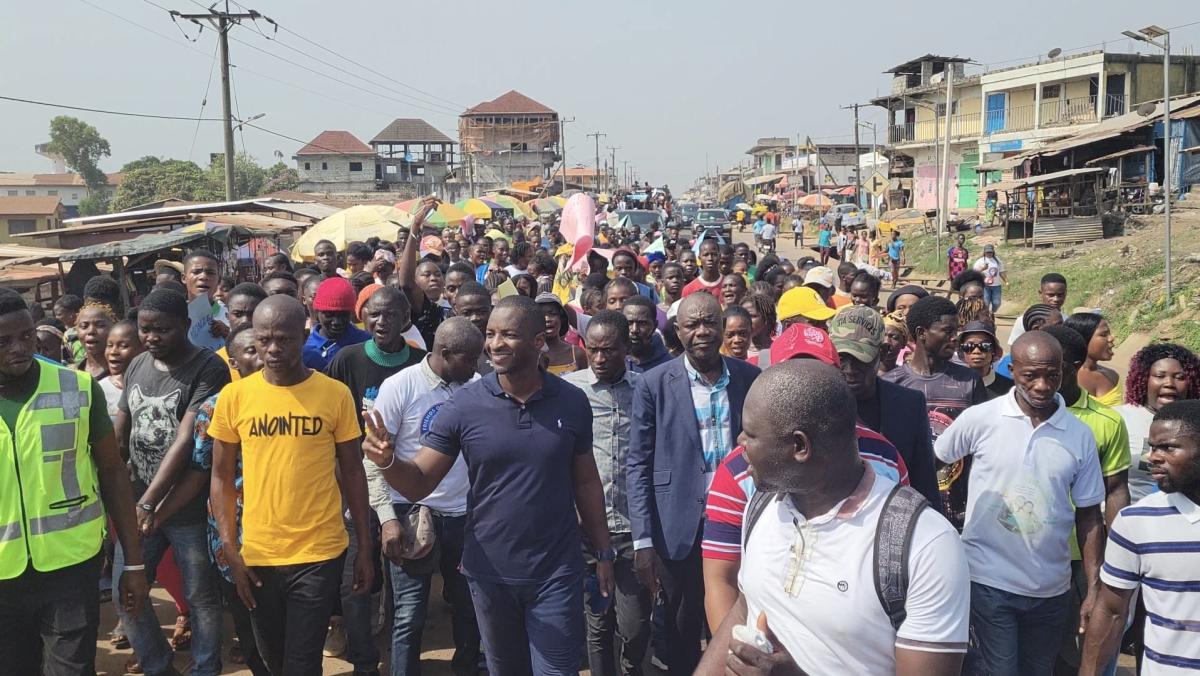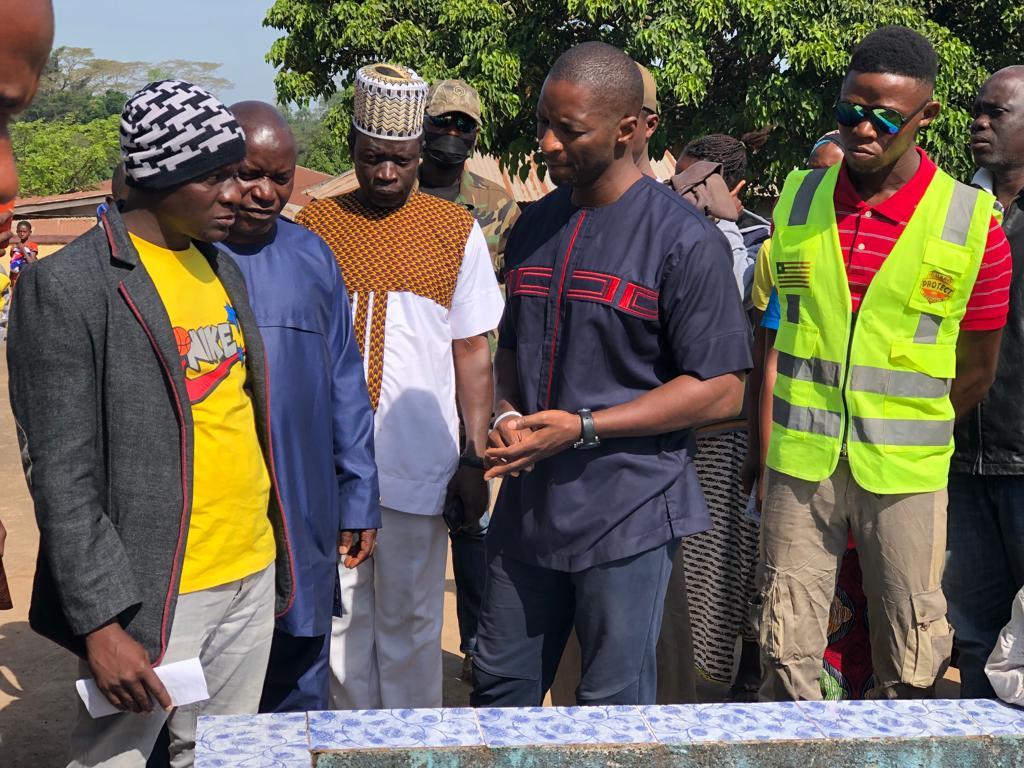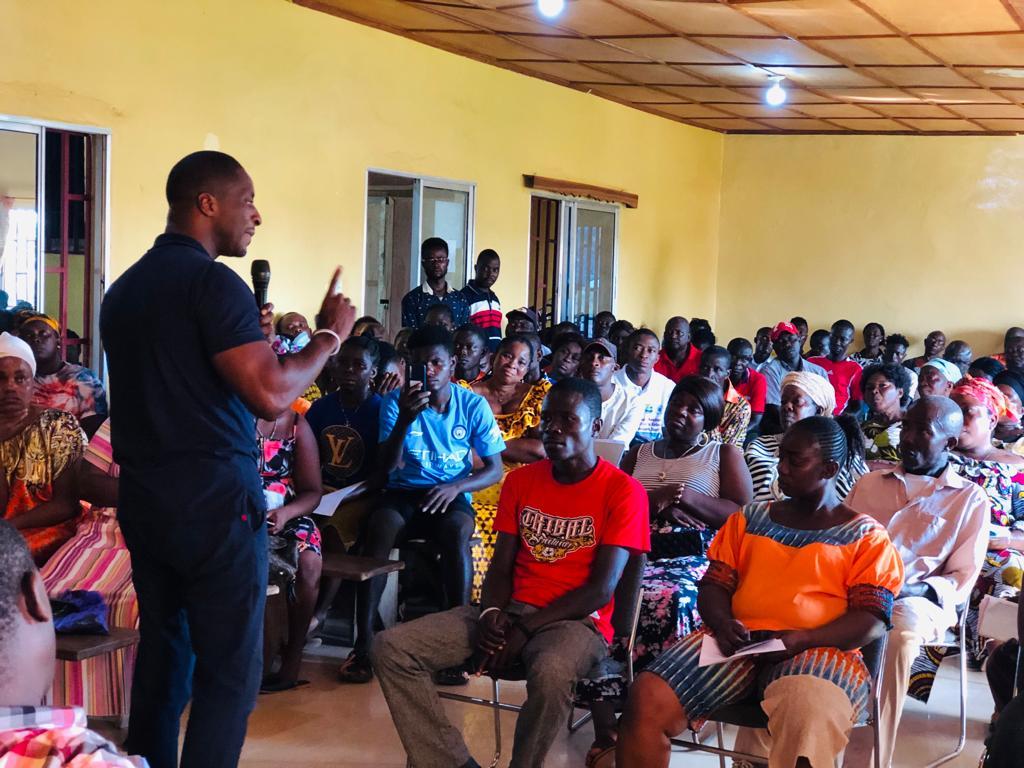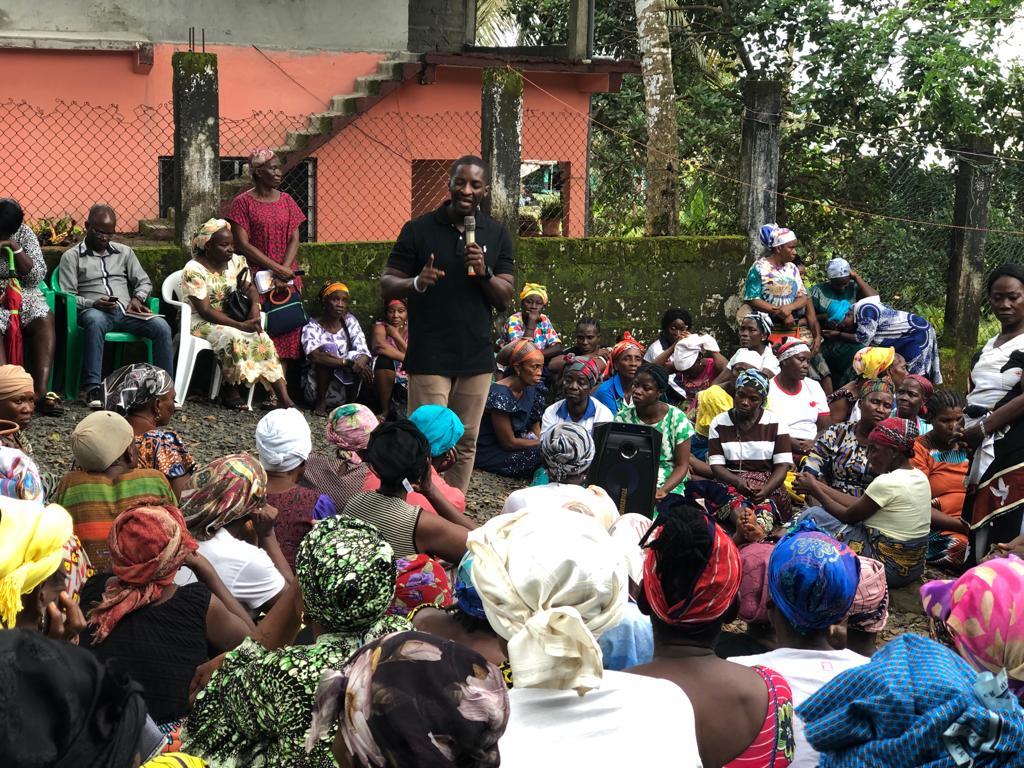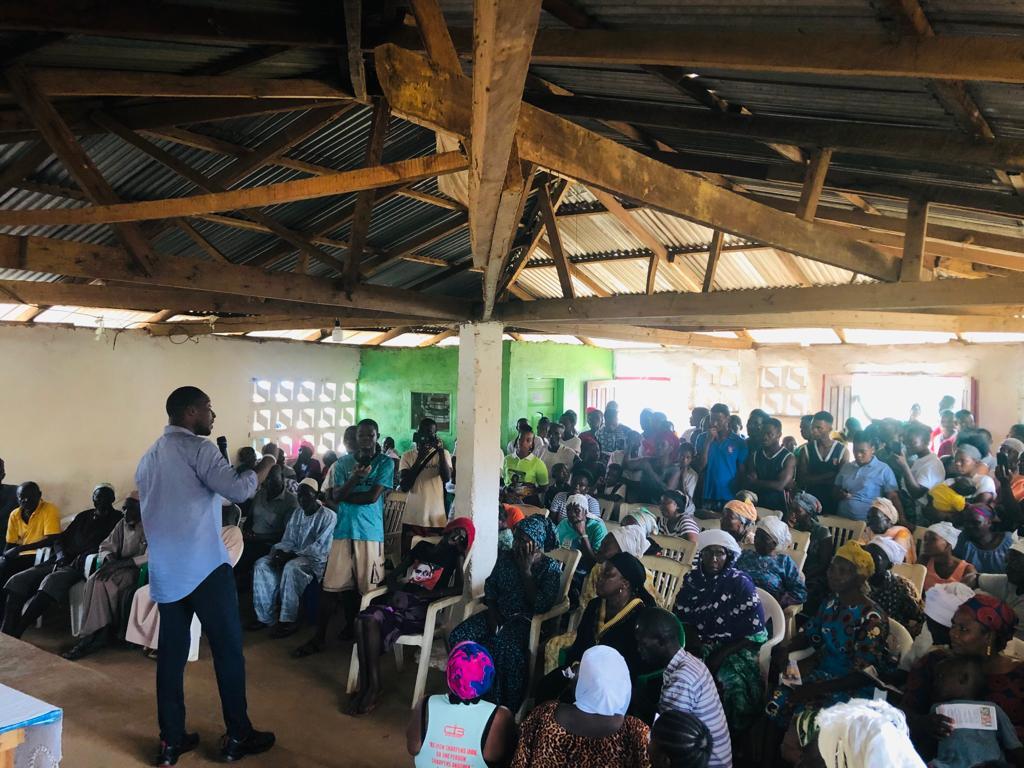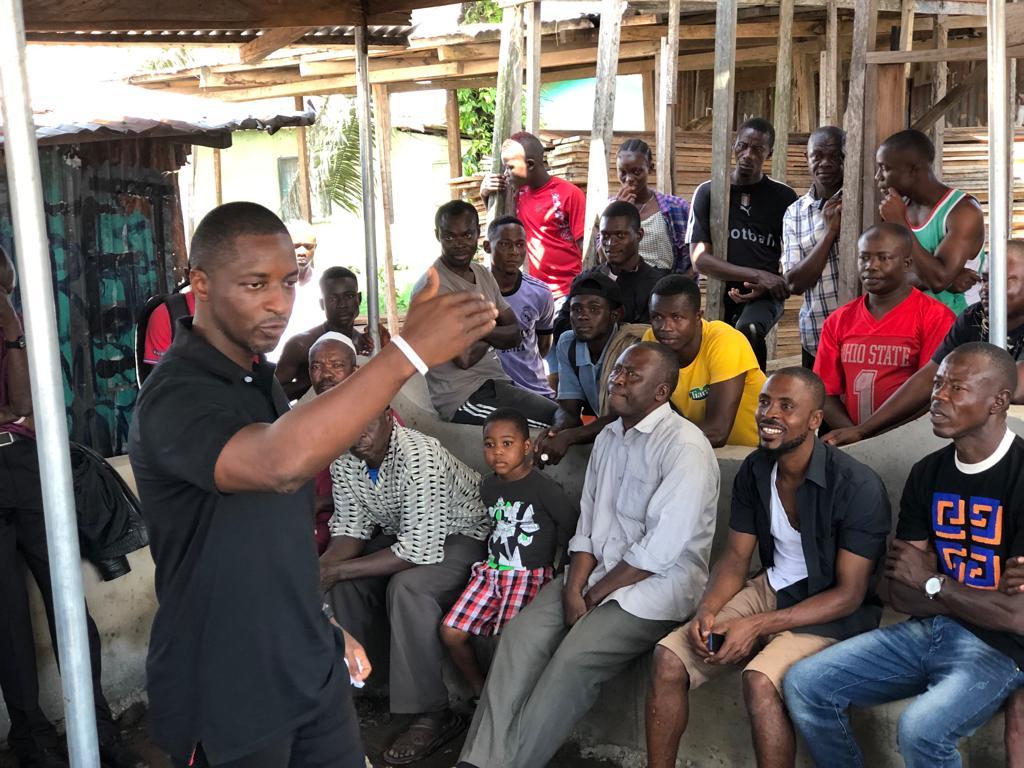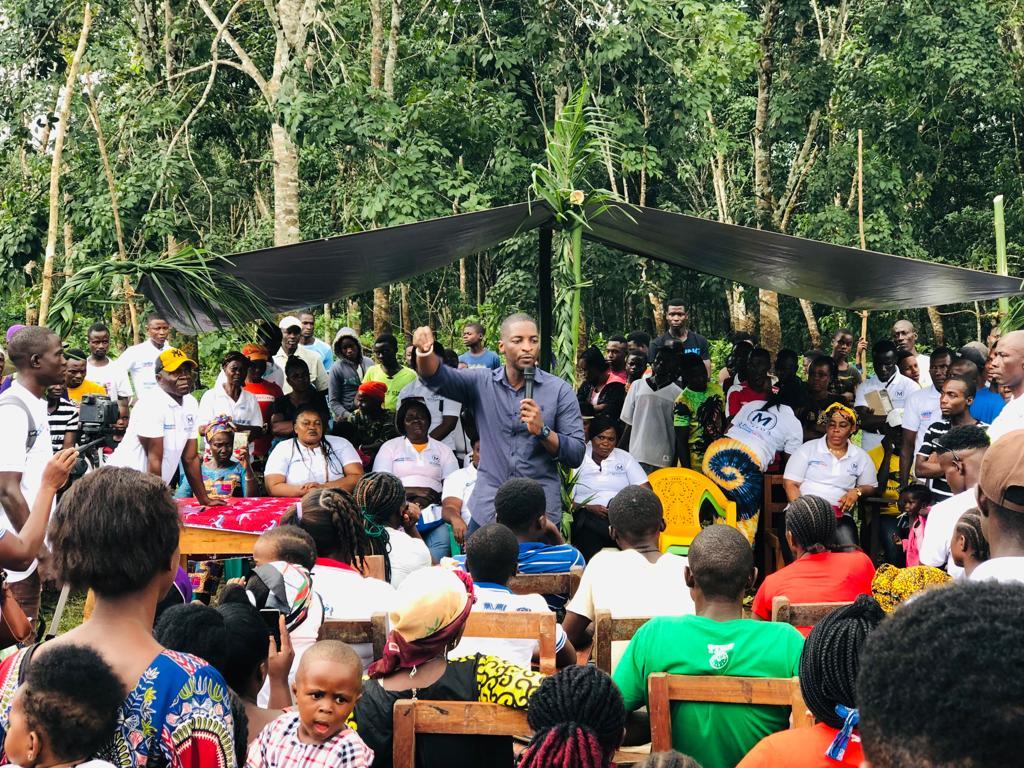2023 Election: Dr. Clarence Moniba’s Presents 'Populist Vision for Liberia'
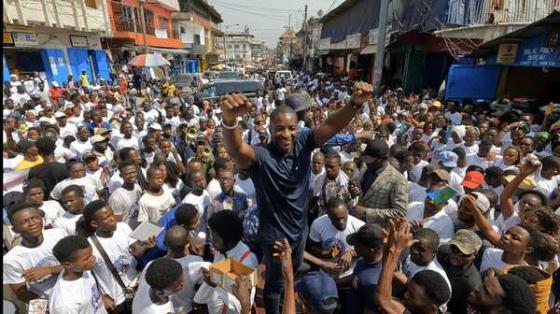
Dr. Clarence Moniba, standard bearer for the Liberian National Union, being received at a political event in Monrovia.
…. “I am driven by the passion to see a Liberia that works for everyone, and that is what I am offering Liberians,” says Moniba whose father was Dr. Harry F. Moniba, a Vice President of Liberia from 1984 to 1990.
Dr. Clarence Moniba may be a long-shot presidential candidate, but his messages of inclusion and accountability are resonating far and wide.
The son of a former Vice President, Moniba's candidacy is unconventional in many ways, not least because he has never held elected political office, but has worked as a technocrat in the government of former President Ellen-Johnson with distinction.
“What Liberia needs is a leader who can inspire people, who can bring them together around a common vision for the future,” says Moniba, who is known for his fiery speeches and his unapologetic approach to politics.
“We need someone who is not beholden to the old political elites, who is not afraid to challenge the status quo. I believe that I can be that leader.”
The 44-year-old who is contesting on the relatively unknown Liberian National Union and has a reputation for fiscal prudence, is emerging as a powerful force ahead of the October 10 elections — energizing voters with promises that critics say border on populism — but resulting in a groundswell of support reinvigorating an otherwise lackluster campaign.
A Liberia that works for everyone
Moniba’s supporters say he has brought an unfussy style to leadership that downplays the privileges of power and political “godfatherism”, which is an entrenched concept in Liberian politics.
His supporters point to his 10-year stay in the Sirleaf government, including stints in foreign missions, the Trade and Investment Office, and the Cabinet — during which time his name was never featured in any corruption report of receiving a bribe — an indication of being a clean character who will not be afraid to tackle corruption which has been a major problem impeding Liberia’s progress for years.
As an advisor and project manager to Sirleaf, Moniba was a leading figure on major investment and infrastructure developments in Liberia — overseeing the implementation of the Japan Drive and the Mt. Coffee Hydro projects — the latter of which he helped secure its US$250 million funding, and working to source funding for other sectors of the country, including the US$255 million MCC Compact in 2016.
By the end of the administration, Moniba had become the President’s most trusted lieutenant and the youngest person in the history of Liberia to be named Minister of State without Portfolio, as well as the Chairman of the Board of the Liberia Electricity Corporation.
Moniba's growing popularity, according to political analysts, is about Liberians’ desire for change as a result of frustration with the status quo, which he has been able to leverage.
“I am driven by the passion to see a Liberia that works for everyone, and that is what I am offering Liberians,” says Moniba whose father was Dr. Harry F. Moniba, a Vice President of Liberia from 1984 to 1990. “I believe that Liberians want something different, something fresh. They want a leader who is accountable. Someone who is transparent and responsive to the needs of the people.
“They want someone who can deliver public services to the citizens in a timely and efficient manner. And that’s exactly what I bring to the table. This is what I am offering and the messages have resonated well with the people.”
‘Spare tyres’
But while Moniba believes the tag of being a long-shot is misplaced, he however faces significant challenges on his journey to the presidency as Liberia’s political landscape is fraught with deep-rooted patronage networks and vested interests.
He is up against more established candidates with more resources and more experience, but who carry plenty of baggage. Since the return to democracy in 2006, the Liberian election has been a two-horse race between the Unity Party, now in opposition, and the Congress for Democratic Change, which is the largest and bigger party in the ruling Coalition for Democratic Change of President George Weah.
The main one is Weah, who despite his mixed achievements recorded during his nearly six years in power, remains the candidate to beat. Both Weah and his main rival, former Vice President Joseph Boakai of the Unity Party can marshal immense resources and may benefit from organized party structures and name recognition that could help swing the election.
However, Moniba seems unfazed and rejects claims that the 2023 presidential elections are a two-horse contest as he points to the buzz his candidacy is generating with voters who have become intrigued by his unconventional approach to politics and impressed by his vision for the country.
He says his main opponents — Weah and Boakia are “spare tyres” interested only in taking everything for themselves in the country — not the kind of honest, capable, and visionaries who can unite the country and inspire its citizens to greatness.
‘About us, not me’
Moniba is convinced that he possesses the qualities and experience to be that leader and is prepared to take on the “Unity Party and the Coalition for Democratic Change behemoths as different sides of the same coin,” who have been accused of dipping their fingers into the public purse.
“I know it’s a tough road ahead. But I’m up for the challenge. I am an ordinary Liberian who has seen the sufferings of my people,” says Moniba. “I want to change that. I am running for the presidency because I believe in the power of the people. It’s not about me; it’s about us.
“Liberia is at a crossroads right now. We have a choice between two paths. One path of backwardness engulfed with corruption and another path to prosperity and a more inclusive and a better society, the future” he says. “We need to bring back the sense of shared purpose that we once had as a nation. We need to focus on what unites us, not what divides us. And we need to start listening to each other again.”
Inclusion and accountability
Moniba’s vision for Liberia is ambitious and one that’s rooted in inclusion and accountability. He argues that these two areas are interconnected and that progress cannot be made in one without progress in the others.
Moniba's inclusion vision, which he says will diversify the economy, and create jobs, hang on building “food production zones” in each of the 15 sub-division of the country to promote food self-sufficiency and also an exporter of agricultural products.
On the inclusion front, Moniba is proposing a range of policies designed to promote growth and reduce poverty. These include increased investment in agriculture to open “food production zones” in each of the 15 sub-division of the country to make the country an exporter of agricultural products and infrastructure, particularly roads and electricity; and the promotion of small and medium-sized enterprises;
The most ambitious ones are replacing the current salary structure with an hourly productivity-based minimum rate as part of a larger drive to move Liberia from a consumption-based economy to a production one; creating a mortgage scheme to spur infrastructure development and home ownership; tripling the budget for early childhood education as well as investing in technical and vocational training for all high school students.
The others are the implementation of targeted social safety nets to protect the most vulnerable members of society; turning the John F. Kennedy Hospital and Tappita Hospital into regional referral and teaching hospitals in West Africa by investing 150 million dollars over a two-year period; and establishing 73 modern states of the art clinics through a joint public, private partnership with subsidized treatment for the poor in each of the country’s 73 political districts.
“These policies are designed to address the social divides that exist within Liberian society. It is ensuring that all Liberians feel that they have a stake in the future of the country,” Moniba says.
As for accountability, Moniba aims to address the rampant corruption that has plagued Liberia for decades by establishing a robust anti-corruption agency, backed by legislation that promotes transparency and accountability at all levels of government.
He firmly believes that tackling corruption is not only a moral imperative but also a necessary step toward attracting foreign investment and fostering economic growth.
Moniba also wants to limit the size of the government — which currently serves as the largest employer in the country to make it more productive; cut down waste expenditures such as the purchase of luxury cars, business class travel, and the unnecessary use of discretionary spending and constitute a gender inclusive Cabinet of capable and honest Liberians.
Corruption and fiscal discipline
He has also promised to appoint a special counsel to prosecute corruption cases. But analysts say the limited fiscal face of the government would pose a serious challenge for Moniba to achieve his populist policies if elected president.
Also, elite consensus is a key part of fundamental reform, and analysts say his repeated vows of fighting corruption to voters would make it difficult to get the support of the elite, who have for long benefited from the spoils system if he wins.
But Moniba counters that the people’s power that sweeps him to power will compel accommodation from the elite.
Moniba’s path to victory, analysts say however seems complicated even if he is often welcomed like a rock star as his campaign train crisscrosses as cash inducement, which still reigns supreme in Liberia politics, is at odds with famed demands for fiscal discipline.
Here for radical change
Critics say while Moniba and his Liberia National Union might be making headway, another pressing threat is the knottier issues like religion and ethnicity which can often determine how votes are cast.
However, Moniba who is from Lofa County, one of the five largest popular counties in the country says his message cuts across and would help him make inroads into the other largest counties.
“I want to give Liberians hope,” says Moniba at a political event recently — a message which seems to be winning new support. “I’m here for a radical change and that change is possible.”
Born and raised in Liberia, before leaving for the U.S during the civil war and later on obtaining a PhD, Moniba has over the course of his career worked for a variety of international organizations, including the World Bank and the United Nations Development Programme, focusing on issues related to economic development, poverty reduction, and governance.
Whether Dr. Moniba's presidential bid can succeed remains to be seen. However, one thing is clear: his candidacy represents a welcome infusion of new ideas and fresh thinking into Liberian politics, and that can only be a good thing for the country and its people.
As the October 10 polls approach, Moniba stands as a symbol of hope and renewal, and with his impressive track record, economic expertise, and commitment to good governance, he presents a viable alternative to the status quo.
But whether he can translate his vision into victory remains to be seen, but one thing is certain: Moniba has thrown his hat into the ring, ready to shape Liberia’s future for the better.

